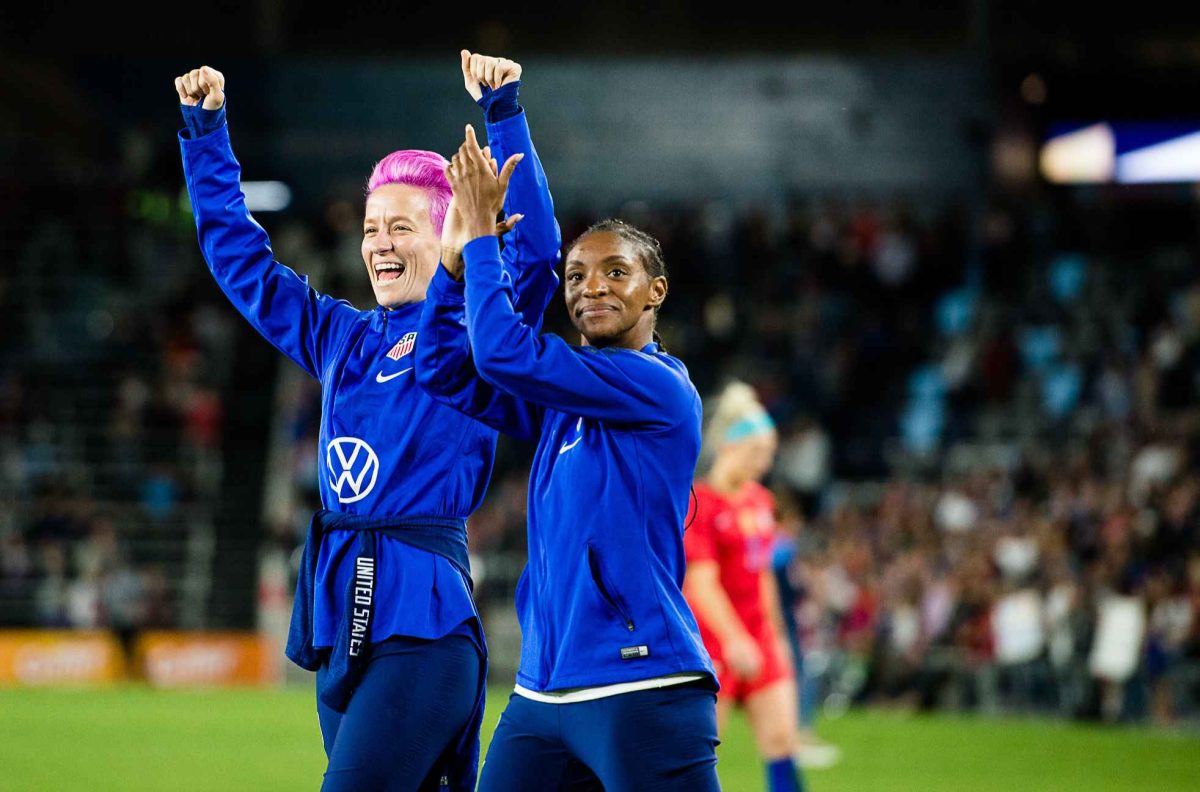When you think of successful soccer in the U.S., you probably think of the Women’s National Soccer Team. You probably don’t think of the lackluster U.S. Men’s National Team (USMNT), who have not been especially victorious.
While the USNMT has had some success in regional events such as the Confederation of North, Central America and Caribbean Association Football (CONCACAF) Gold Cup, they have struggled in the World Cup. In reality, the USMNT has only made it past the Round of 16 once in its history, in 2002 in South Korea and Japan.
On the other hand, the U.S. Women’s National Team (USWNT) has been consistently successful. They have won four World Cups and four Olympic gold medals. Yet they often receive less recognition than their male counterparts. I believe that the women’s team and all female soccer players deserve more credit for their achievements, hard work and grit that they put into the game. Nonetheless, some factors are holding them back.
One way that would help acknowledge female athletes’ accomplishments and efforts is equal pay, which is a critical step toward the game’s growth. Many countries such as England and Brazil announced their own equal pay agreements in 2020, while the U.S. only introduced it in 2022.
In the U.S., equal pay is implemented by splitting the prize money earned by the men’s and women’s teams. Teams collect prize money based on how far they advance in a competition, which has made a significant impact on the USWNT, whose prize money is far lower than the men’s. In fact, the USWNT only received $6 million in total for winning back-to-back World Cups, whereas the men’s team received $13 million for reaching the knockout stages this past year.
Another main factor is the Fédération Internationale de Football Association (FIFA), soccer’s governing body. Many of FIFA’s leaders, such as Former FIFA President Sepp Blatter, are sexist. Blatter once stated that female players should “wear tighter shorts” to increase interest in the sport. His comment is just one example of how the international soccer community does not take female athletes seriously and easily objectifies them.
Furthermore, historically, there has been less investment in women’s sports. Women’s sports receive only 5% of media coverage, according to a recent study conducted by the University of Southern California and Purdue University. It is easy to excuse the lack of funding by stating that women generate less revenue, however, investment and revenue go hand in hand. Without investment in women’s sports, stereotypes will continue, and many people will stay closed off and not watch women play.
I have been watching and supporting the USWNT and female soccer worldwide throughout my life. Recently, on social media, I’ve noticed a hostile attitude toward female soccer players, such as sexist comments, gender-based discrimination and harassment. I’ve been playing soccer since I was four years old, and I’ve seen a lot of hostility toward my abilities because of my gender. I remember hearing things like, “You’re good for a girl” and “Don’t pass to her.” Female athletes face sexism in a variety of forms in sports that are supposed to empower us.
When viewing internet discussions, there is always someone bringing up reasons why women’s soccer will always be worse than men’s soccer. My favorite argument is the under-15 (U-15) boys’ team from Texas upsetting the USWNT in 2017. This argument is not only overused but is also told out of context.
The game was a scrimmage to aid the development of the young team. Most soccer federations do this to improve soccer around the country; these types of scrimmages are common. The loss then began to circulate on the internet. It became an obvious target for people with misogynistic views towards women’s soccer. While some may argue that men’s soccer is superior to women’s soccer due to viewership and revenue, it is critical to recognize and celebrate women’s sports achievements without dismissing them.
Women’s and men’s soccer are the same. They have the same rules, yet our culture and FIFA refuse to accept them as equals. The gap between the men’s and women’s teams needs to be addressed on a social level, as well as on an institutional level through FIFA, and implementations of equal pay in other nations.
There is no rational reason to prefer men’s soccer over women’s soccer, and sexist stereotypes and out-of-context information about women’s athletic ability are no longer acceptable. I hope that those of you who have been putting off watching women’s soccer will tune in this summer to watch the World Cup and see fantastic players compete for the ultimate trophy.
By Zoya Zwart


































































